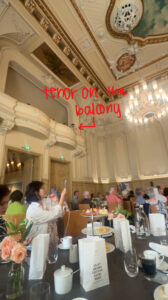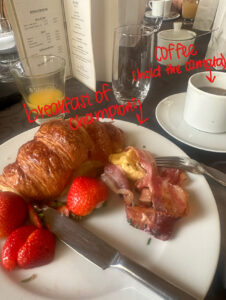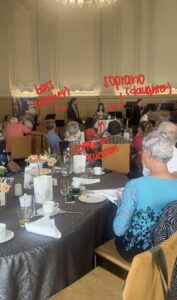If you told me a few months ago that one of my favorite mornings in Leipzig would involve opera-style improvisation, free croissants, and a dive into 18th-century caffeine politics….I probably would’ve believed you, honestly. But I definitely wouldn’t have imagined it would all come together as beautifully as it did at the (numerous) Cantatas performance this Saturday. Specifically, the performance of Bach’s Coffee Cantata (BWV 211) was one of those rare events where every element, music, space, staging, and even the breakfast, came together in a way that made the whole thing feel both special and surprisingly current.
The program featured Bach’s Schweigt stille, plaudert nicht (or Coffee Cantata for those uninterested in authenticity) is basically a mini comic opera, complete with a dramatic father-daughter standoff over….coffee. It was performed with wit, energy, and a creative sense of staging that made the music feel incredibly alive. The tenor(Fridolin Wissemann), who served as the narrator, delivered his part from a balcony ledge a story above and off to the side, while the soprano (Yumi Tatsumiya, playing the daughter) and bass (Lucas Reis, the father) performed at ground level in front of us. That spatial dynamic made the piece feel like it was unfolding in real time. I sat there with a cup of coffee in hand, watching this hilarious drama unfold (I even watched Vito fearfully say “nein” when the father asked him to marry his daughter. Guess he wasn’t interested in letting his potential wife drink coffee three times a day).
And speaking of the potential wife, she was brilliant. Yumi’s voice was clear and expressive, but what really stood out was her presence. Her acting was both playful and grounded, completely in sync with the tone of the piece. Afterward, I had a chance to speak with her and was amazed to hear that much of the acting was improvised. It’s one thing to perform Bach well; it’s another to bring humor, spontaneity, and emotionality to a centuries-old piece with such confidence and timing.
Even though I’m not much of a coffee drinker myself, I found the cantata’s subject unexpectedly interesting. Written at a time when coffee culture in Europe was still developing, and when women in particular were mostly discouraged from drinking it, the story becomes more than just a musical joke. The daughter’s love for coffee became a stand-in for something bigger: autonomy, desire, and resistance. It wasn’t just about caffeine, it was about access and control wrapped in clever writing and expressive music. This made watching this piece (as a woman in 2025 casually sipping coffee) feel both funny and empowering. On top of that, watching it performed by young musicians who brought their own interpretations to the roles made that dynamic feel even more layered.
There’s something delightful about starting the day with a performance like this: lighthearted, beautifully sung, and historically rich. It reminded me just how much personality and humor there is in Bach’s secular music, something that can often get overlooked next to his larger sacred works.
If this performance is any indication, Leipzig mornings are best spent with live music, coffee, and a bit of theatrical flair.



Screenshot
Cara, Thanks for this! It’s great. I love the coffee cantata. It’s so wonderfully playful—one of my absolute favorites!! It does take us to a time where coffee was exceedingly exotic and perhaps a little too dangerous for young women!
Bach wrote a lot of the coffee house — it must have been as fun then as it now!